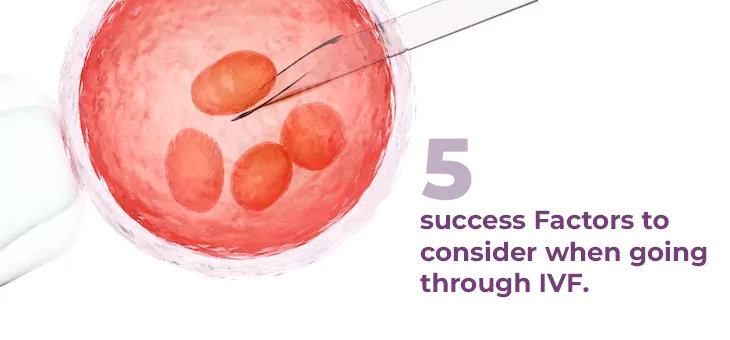We all are aware that IVF is an expensive and complex procedure. This cannot be compared with artificial insemination in which the sperm is placed inside the uterus and the conception occurs normally. During the IVF process, the sperm and egg get combined in a laboratory outside of the body. When the embryo forms, it is then placed inside the uterus. IVF success also is dependent on some factors. Here is the list of 5 success factors that you should be aware of while going through the medical procedure.
1. Age
Understand that there is an undeniable link between IVF success rates and age. As per the statistics provided by CTC for IVF, patients age 35 have about a 27% success rate. This needs about 5 embryos that have around 80% success chance. Patients of age 38 have this success rate of about 23% and 6 embryos with 80 percent success probability. This percentage decreases further to 18% for women age 41. So clearly, the faster you consult the IVF specialist while experiencing issues with fertility, the better will be the chances to get pregnant.
2. Fertility Issues
Some of the common fertility issues that IVF is responsible for are:
1. Ovulation issues.
2. Endometriosis.
3. Blockages in the fallopian tubes.
4. Low sperm count.
Then some issues are less likely for responding to IVF. These are:
1. Abnormalities in the uterine wall.
2. Fibroid tumor.
3. Ovarian dysfunctions.
4. Dual Infertility reasons.
5. Long term infertility.
3. Former Pregnancy
The chances of former pregnancies can enhance the likelihood of success at the time of IVF. On the other hand, if their earlier pregnancy had ended in a miscarriage, the success chances can be lower for some cases. There is a need for expert assistance for identifying the causes that had lead to the miscarriage. This helps to understand if it might impact the present IVF treatment.
4. Donor sperm and/or eggs
Many factors can affect the egg and the embryo quality: Some of these includes
1. Ovarian reserve and age.
2. Sperm quality.
3. Protocols for controlled ovarian stimulation also called COS.
4. Embryo selection.
Couples have the choice of going for an anonymous donor for the IVF procedure to increase the success rate under specific conditions. It is also important that you know that 90 percent of the chromosome aberrations in the chromosome is a result of the egg not because of sperm issues. Some might argue that as fertilization is the center pin for successful IVF, the sperm quality plays a major role.
ICSI (Intra Cytoplasmic Sperm Injection) has removed male infertility as an obstruction for the success of IVF. With ICSI it has become possible to fertilize the eggs with sperm that has been derived from men with some of the severe cases of male infertility as well. This makes pregnancy rates higher than the ones that were earlier performed with conventional IVF that's performed in many cases.
5. Lifestyle
Smoking is one of the detrimental factors for fertility and is observed in both women and men. Therefore this should not happen during the procedure of IVF. Also if a woman is under or overweight, there can be a significant impact on the success of fertility medicine absorption. And also the capacity to carry the baby to the time required. People that have been going for the IVF process should be considering some of the lifestyles changed for improving the success rates.
Bottom Line
For optimizing your results of IVF, the doctor has responsibility for trying to enhance the environment for proper implantation. This maximizes the probability of pregnancy and also enhances life quality after birth. Before you select a specific fertility center in Bangalore, there are some factors that you should also keep in mind. The hospital must be equipped with advanced technology, have experienced doctors, and the live birth rate per cycle. Do understand that this fertility journey requires so much of your patience, and a good fertility clinic works hard for making the IVF a success. The experienced doctors at Cambridge pay attention to each issue within the medical control. This is an excellent choice of procedure for people that are struggling to conceive naturally.


